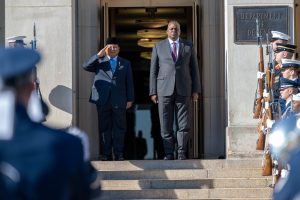Indonesia’s newly-inaugurated President Prabowo Subianto will visit China and the United States when he undertakes his first overseas trip next month, the local newspaper Kompas reported yesterday, signaling his intent to strike a careful balance in Indonesia’s foreign relations.
Citing sources in the presidential palace, Kompas reported that Prabowo will depart for Beijing on November 8, where he will meet his Chinese counterpart Xi Jinping and Premier Li Qiang. He will then fly to Washington to meet U.S. President Joe Biden, before making stops in Peru, Brazil, and the United Kingdom.
After his election victory in February, Prabowo made it clear that foreign policy would be a central focus of his administration. Prior to taking office on October 20, he embarked on a dizzying rota of international trips as president-elect, visiting 21 countries, including China, Japan, Russia, and Australia.
Kicking off his presidency with a five-nation trip involving the world’s two most powerful nations, as well as three other important partners, indicates Prabowo’s desire to pick up where he left off and suggests that he will play a much more active role in foreign affairs than his predecessor Joko “Jokowi” Widodo. In comparison, Jokowi’s first overseas trip as president in November 2014 took him to three countries: China, Myanmar, and Australia. Notably, all three of them were for multilateral meetings – the APEC meeting in Beijing, the ASEAN Summit in Naypyidaw, and the G-20 Summit in Brisbane – and Jokowi’s first bilateral visit did not take place until February 2015, when he visited Malaysia. He did not make a state visit to the U.S. until the following October.
In comments to the Straits Times, Julia Lau, a senior fellow at the ISEAS-Yusof Ishak Institute in Singapore, said that the differential focus on foreign relations reflected the backgrounds of the two leaders. She compared Jokowi’s upbringing in small-town Java to that of Prabowo, whose father Sumitro Djojohadikusumo was a well-known economist who held a number of academic posts overseas. As a result, his family lived in several countries, including the United States and Britain, where Prabowo was educated and grew up in an international milieu.
As Lau told the paper, the new Indonesian leader “is personally more comfortable meeting foreign counterparts and has had the past decade to work on his ties to his defense minister peers but also a lifetime of exposure, starting from when he was very young, to foreign cultures and experiences.”
However, despite his more hands-on approach to foreign policy, Prabowo is unlikely to deviate from Indonesia’s long-standing “free and active” foreign policy doctrine, in which it avoids binding international alignments and will seek to maintain good relations with as many important countries as possible. Indeed, Prabowo’s decision to visit both China and the U.S. on his first trip abroad as president suggests a proactive effort to maintain a balance between the two emerging power configurations. As I noted last week, this policy also explains Prabowo’s intention to join the BRICS grouping, something that Jokowi declined to do. It also dovetails well with the fact that Indonesia will next month hold its first joint navy drills with Russia, in Surabaya.
In comparison with Jokowi, Indonesian foreign policy will remain just as “free,” if slightly more “active” when it comes to the role of its new leader. As Yohanes Sulaiman of Universitas Jenderal Achmad Yani, wrote in an article published this week, Indonesia’s foreign policy under Prabowo will continue to take “the path of strategic ambiguity, that it is willing to work with everyone, but at the same time unwilling to commit to any side fully.”

































